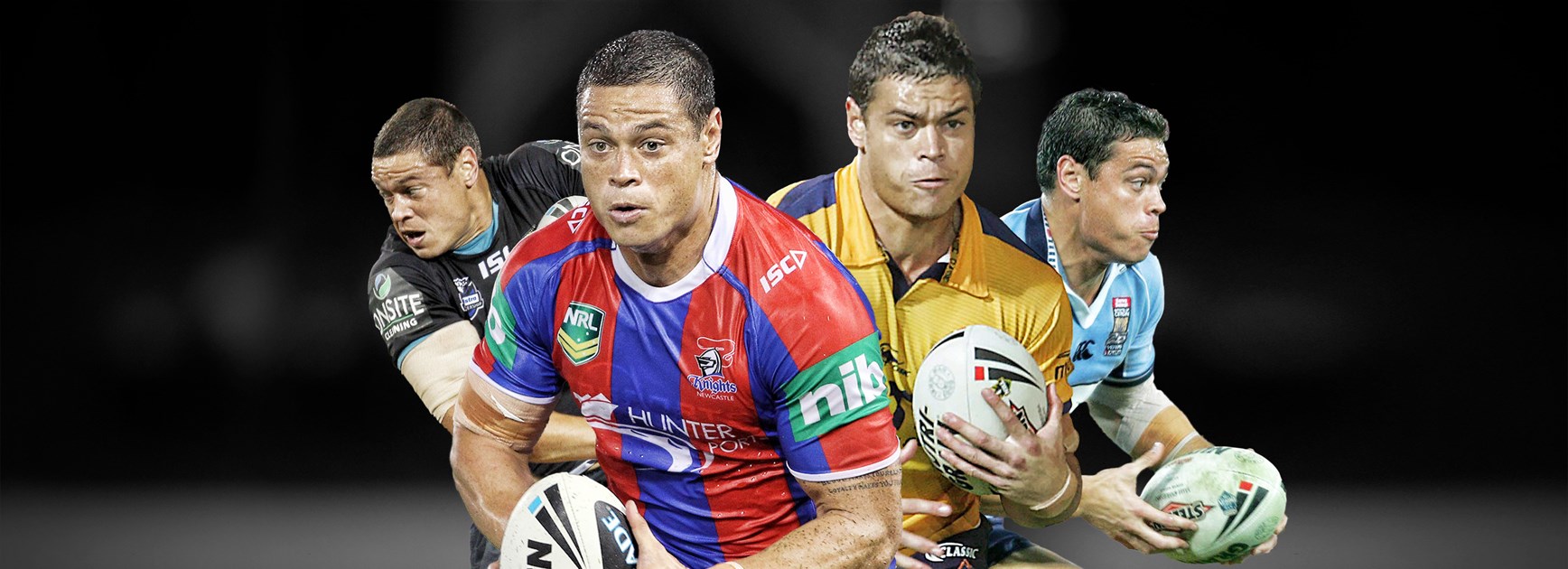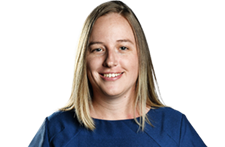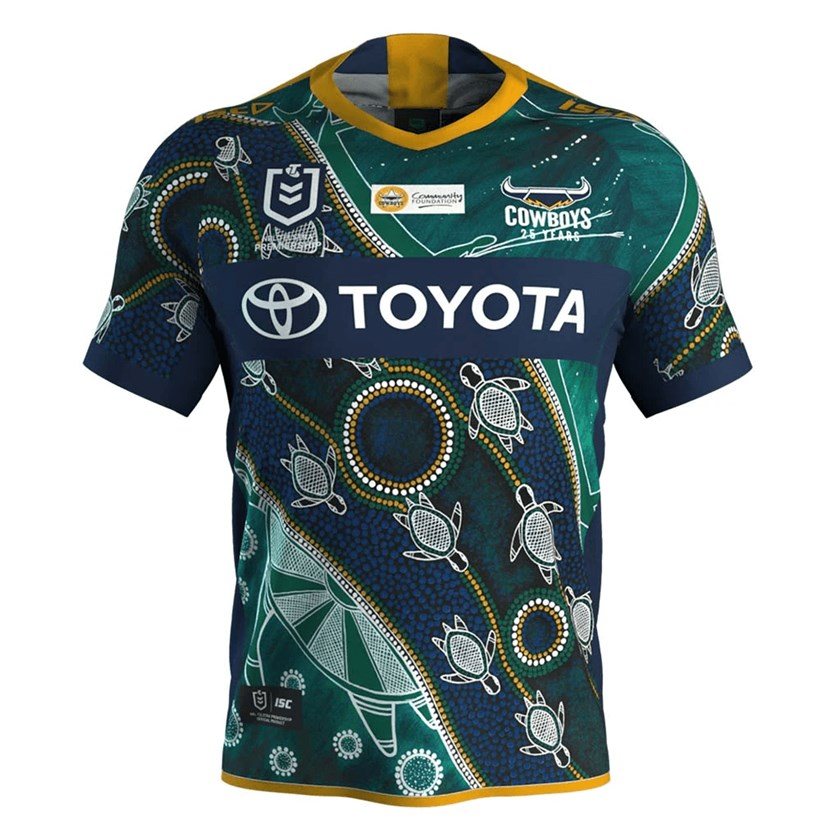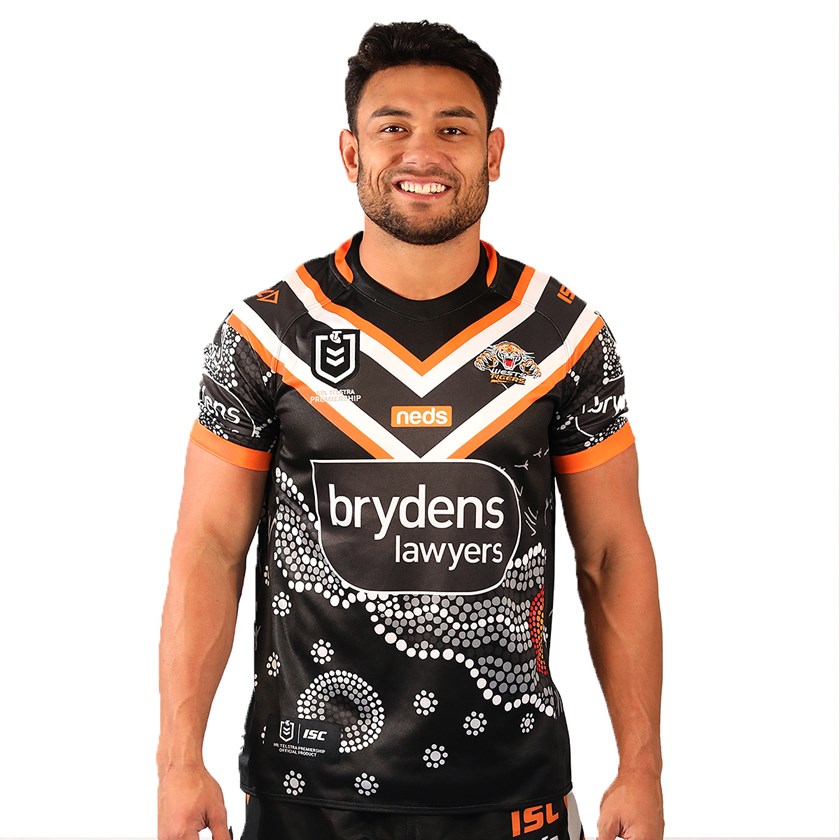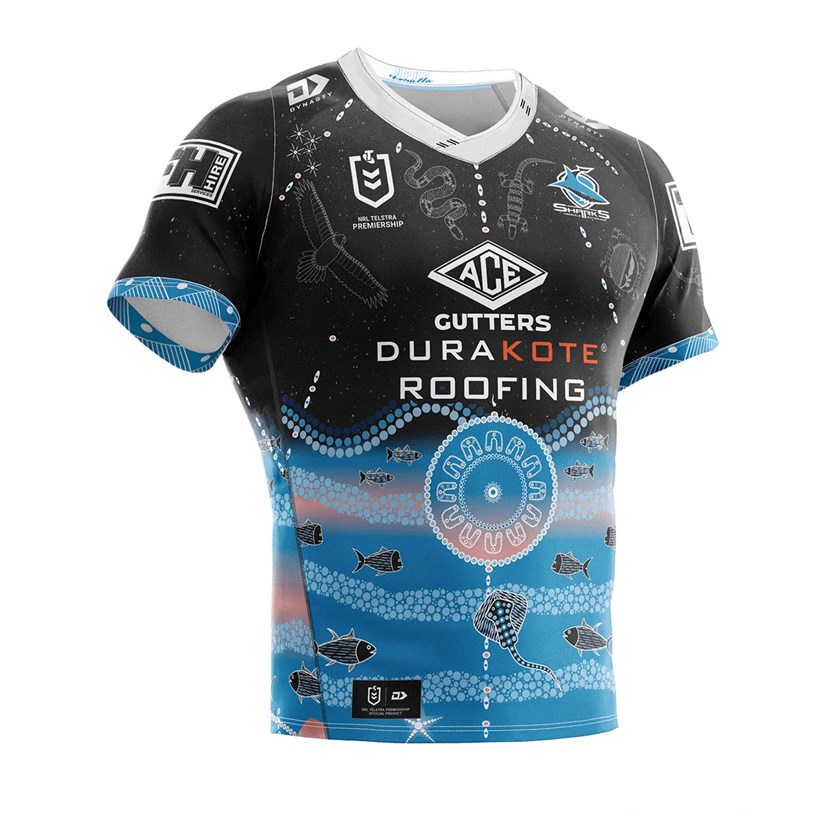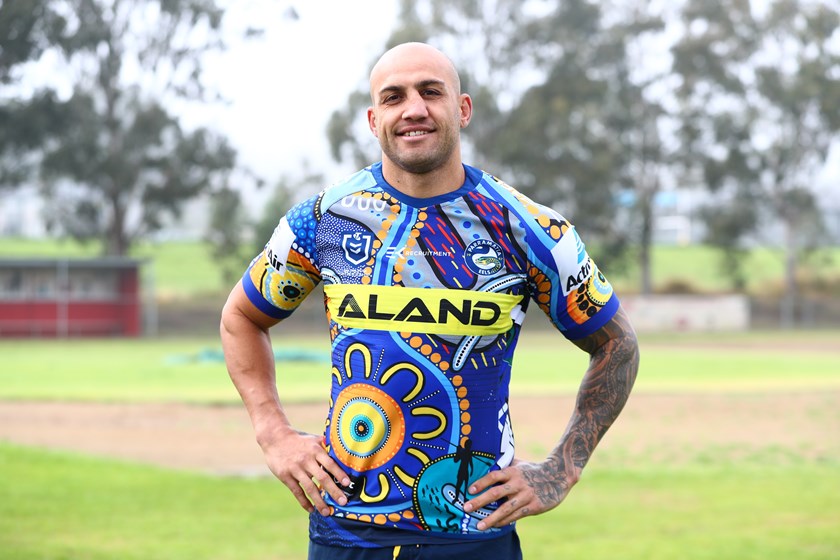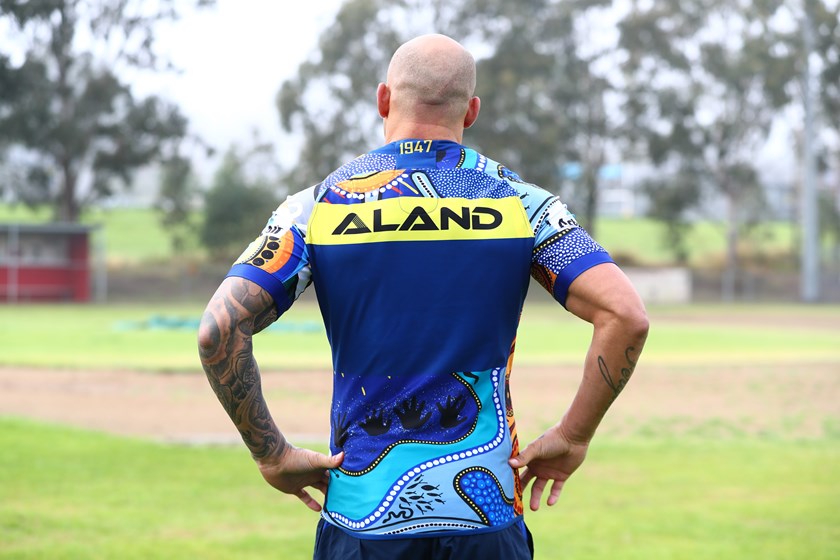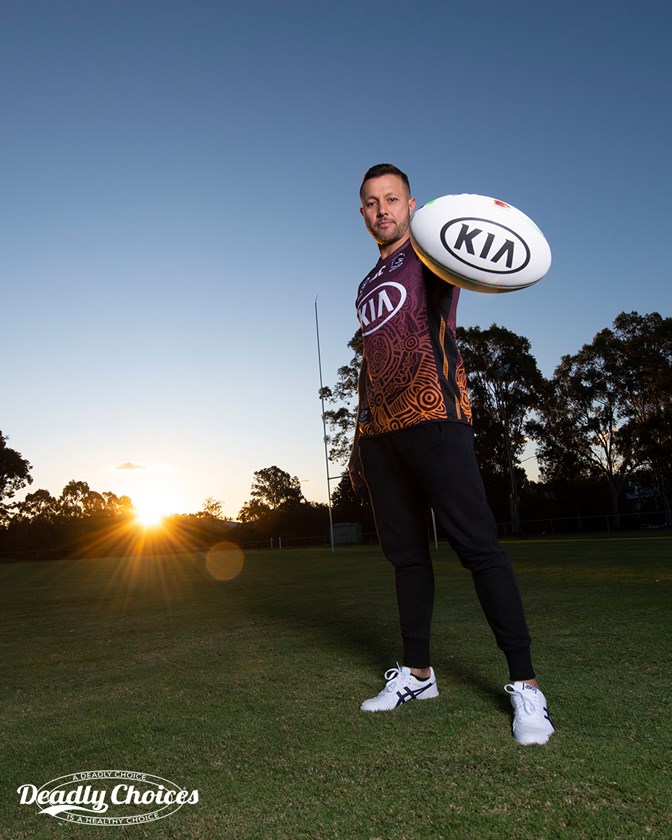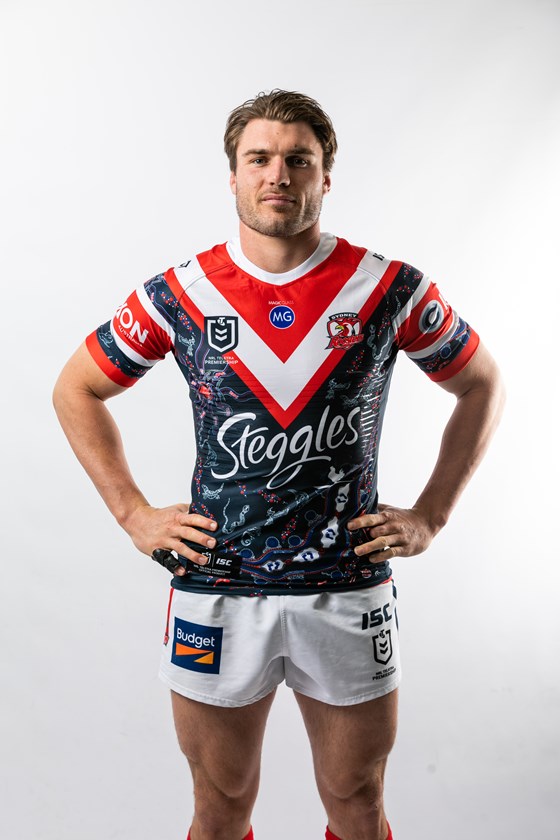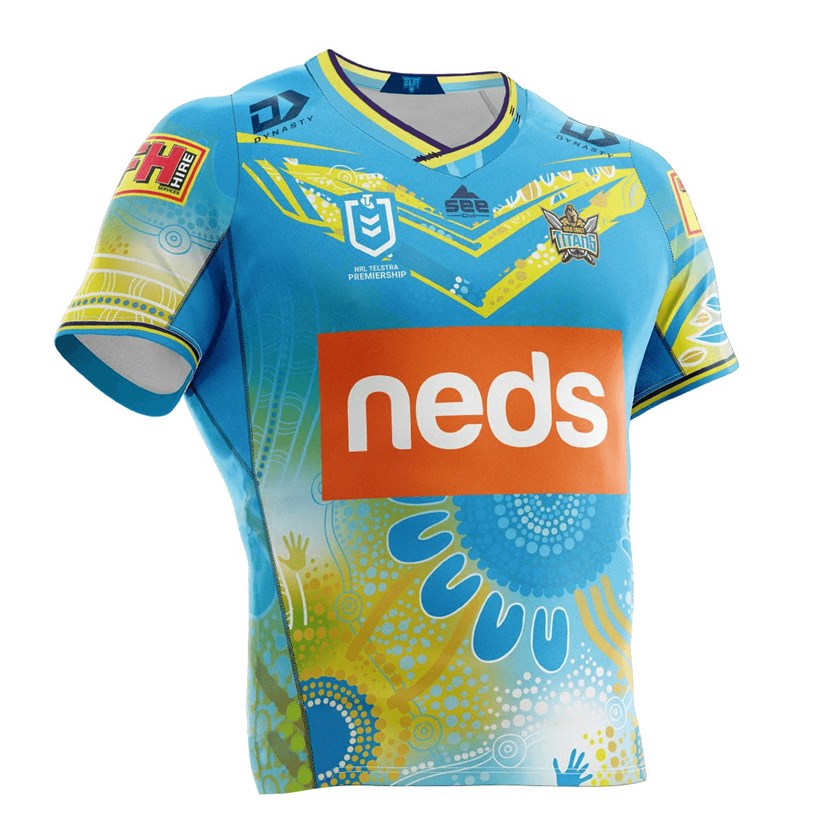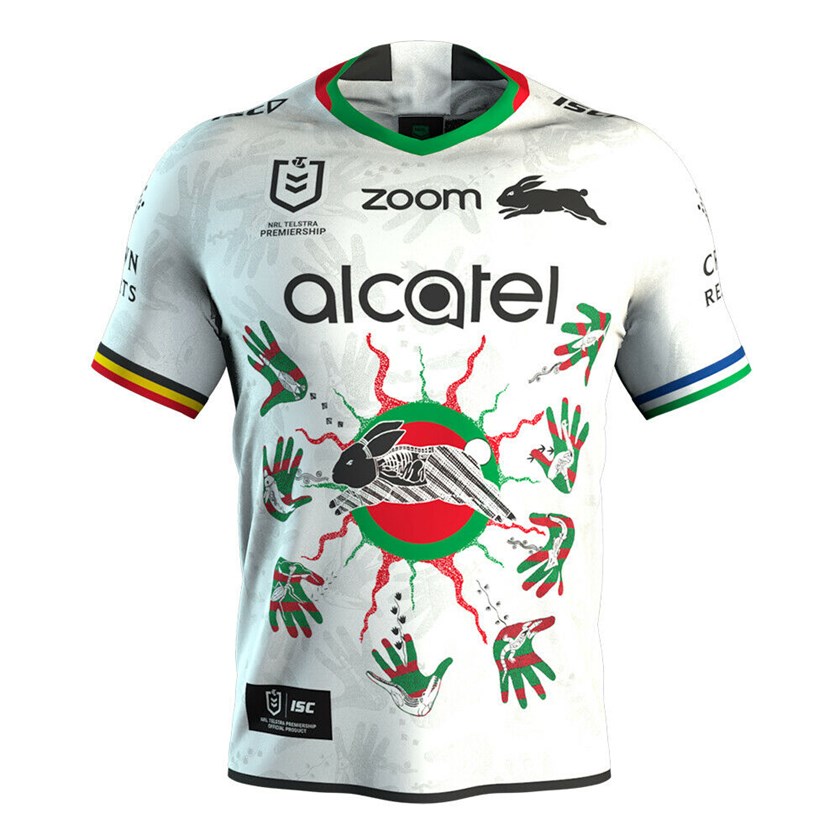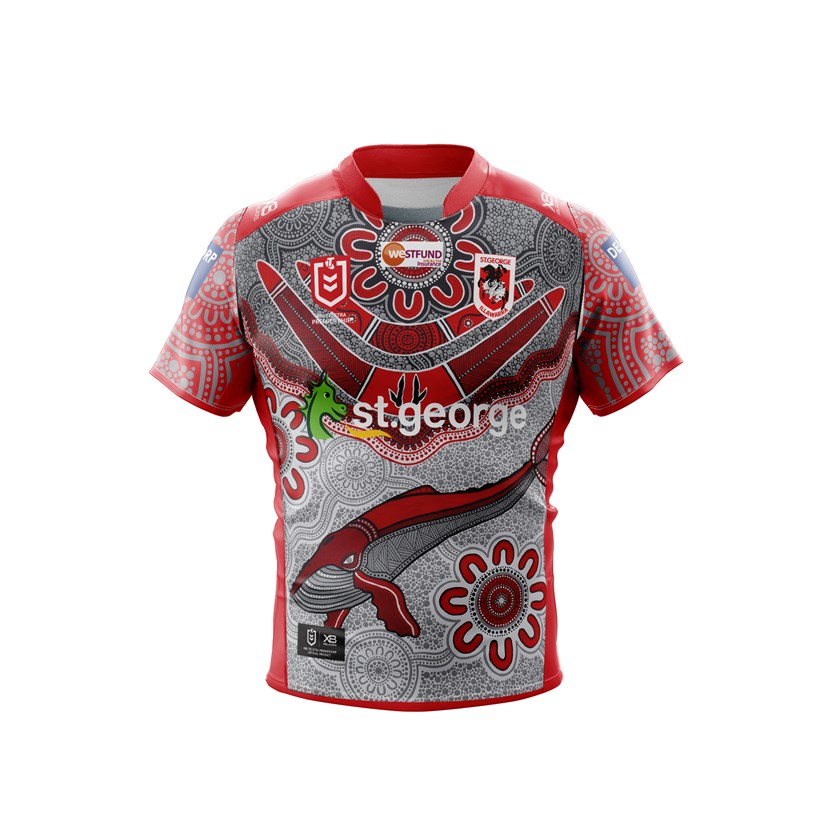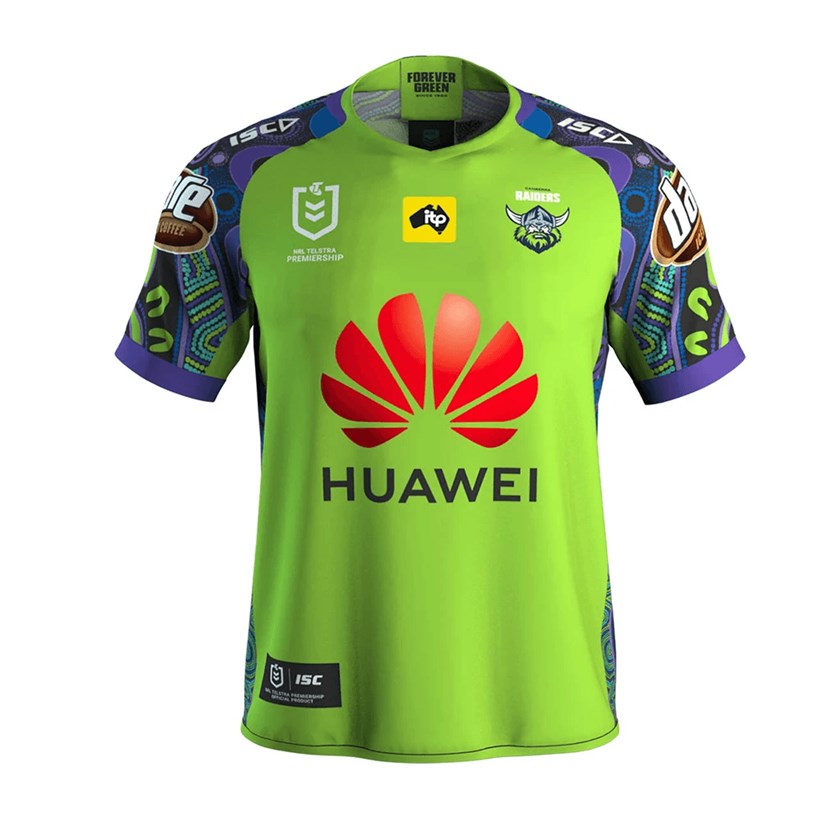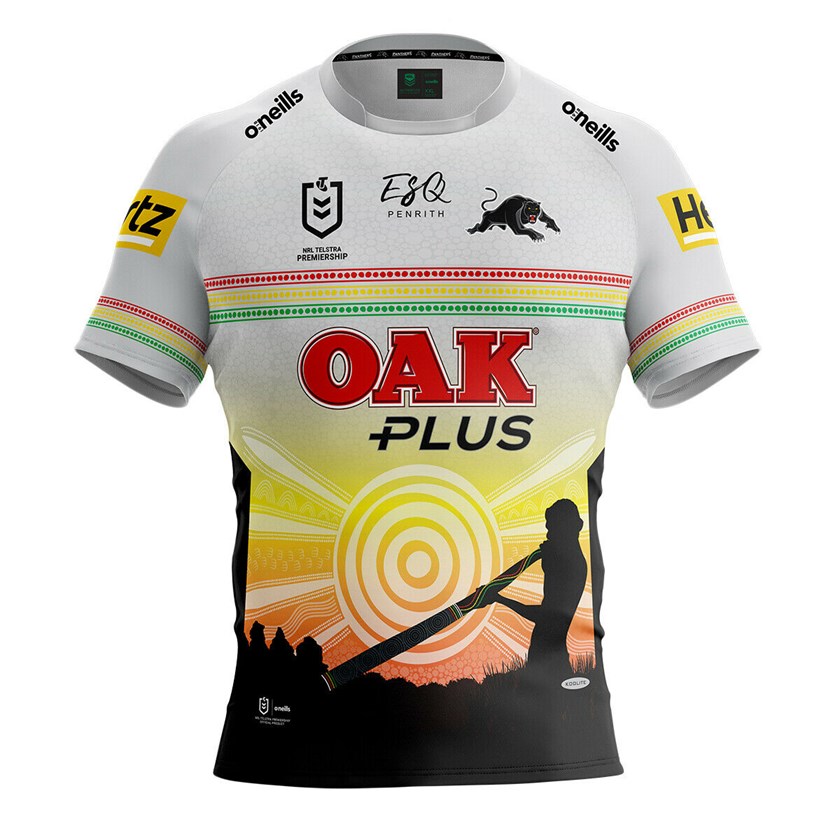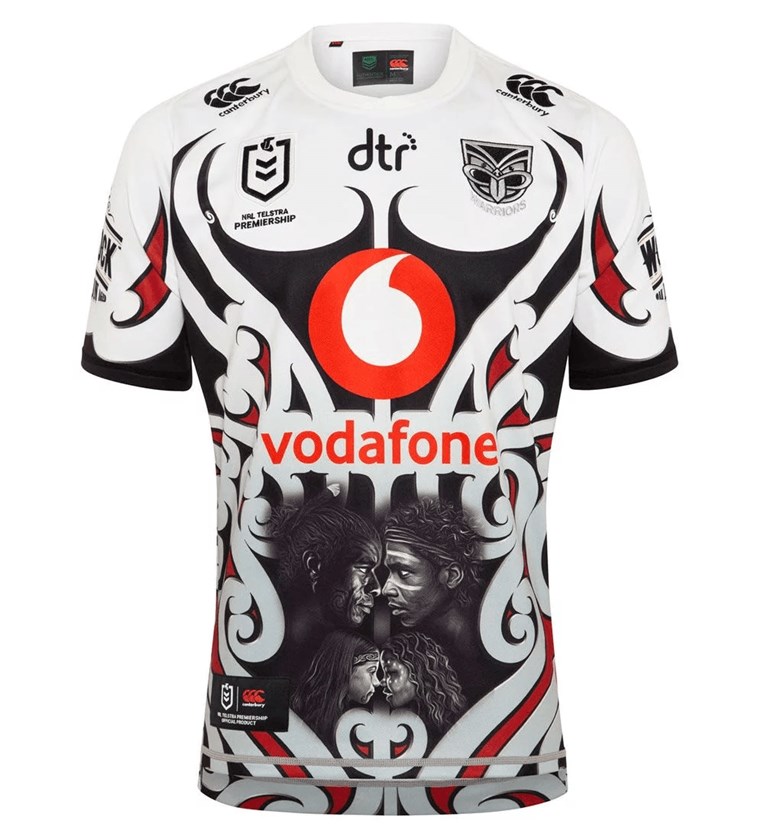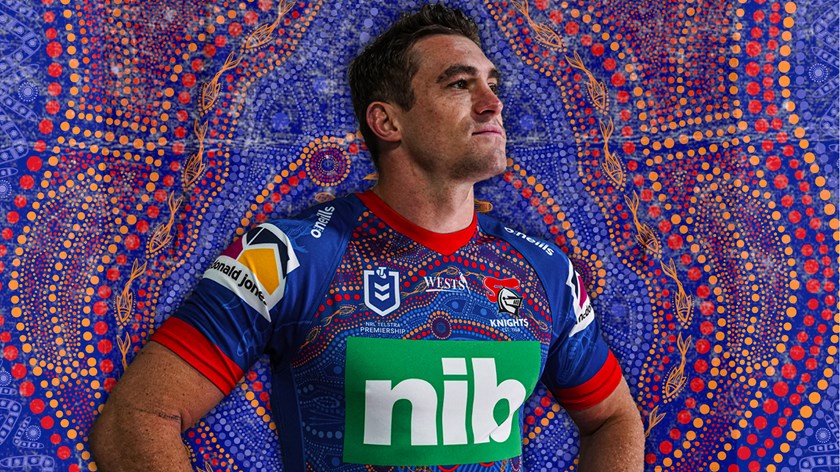From humble beginnings as an NBA fanatic growing up in St Kilda to finishing his dual-code sports career in the USA - Timana Tahu has had one decorated journey.
A dual-code international during his 17-year journey across rugby league and rugby union, Tahu was arguably one of the most naturally-talented outside backs to ever lace on a boot.
However, rugby league wasn't always on the radar for the now 39-year-old, who joined NRL.com for a trip down memory lane to reflect on key moments in his life that shaped his career.
Legend Q&A: Timana Tahu
You were born in Melbourne before moving to Northern NSW – what drew you rugby league and how did you end up at the Knights?
I played a lot of basketball growing up and wanted to play in the NBA, but the Maori community started up rugby league in St Kilda and my dad was part of the team. Sports at school were mainly AFL in winter and cricket in summer but my parents always drilled rugby league into me.

My mum is from Bourke in NSW so I was always back and forth in different areas once I moved closer to her. I was playing a lot of basketball in Newcastle. All the boys I was hanging out with were going to a Hunter region zone trial and I pretty much wanted to get out of school for the day. I didn't have a pair of boots so borrowed a pair from my hostel mate.
There was a scout handing out invitations to Newcastle Knights trials and the Hunter Mariners were there handing some out too with the Super League war happening. I wasn't really focused on footy or anything but I made both squads and at the time it was around the 1997 grand final so I went in that direction.
The Knights were about to enter a premiership window when you made your debut in 1999 - what was that period like coming into first grade?
I was around good mentors first and foremost. A lot of players like Tony Butterfield, Matt Parsons, Ben Kennedy, and Matty Johns … the list goes on. I was around seasoned and experienced men but also protectors – they protected me on and off the field. I learned how to be a leader and to do my job no matter what it was, to do it your best.
If we were out of line we got pulled back in fairly quick. I think that's what turned me into a successful athlete for 16 years. I do remember Chief (Paul Harragon) retired the day I made my debut against South Sydney.
I was looking forward to playing with him because Mark Carroll was playing for the Rabbitohs at the time so I thought how good was this going to be, I could sit back and watch them go at it. But he pulled out the day before and never played again.
Laid bare: Renouf, racism and rugby league
Your combination with Matt Gidley at club, state, and international level was electric – what was the secret to your success with him?
We never practiced together, it was mainly all instinct. There were no drills to what we did. I was good at reaction and speed and he was good with agility and hand-eye coordination. It was the perfect storm.
I scored a lot of tries during that period with him and it was due to being around players like Matt, the Johns brothers and Adam MacDougall. It was just a special time when you've got the Johns boys throwing 20-metre cut-out balls and two-pass shifts from one sideline to the other every set.
They would hit Gids and he'd do the one-two punch combination. We got a lot of success out of that and took it into Origin with Joey, myself and Gids.

One thing I will see is that freedom of passing the ball around has slowed down in recent years because the ruck speed has. The Melbourne Storm learned to master that and got a lot of success out of it. Once they got the sniff of it all the other teams started to do it.
It's great Peter V'landys has changed the rules because now we're getting to the point where it needs to be drummed out of kids again – teaching them to play eyes up and creating space. Being involved with the NSW elite junior squads last year and talking to Joey [Johns], Danny [Buderus] who are part of those men's and women's programs – they've gone back to those ways and structures.
You can see it now with the way the NSW team has played in the last couple of years under Freddie (Brad Fittler), they've gone away from the structure with Joey and Bedsy (Buderus) coaching. I think we're about to enter into a new era where the next generation is going to be playing a lot more eyes-up football.
Your slam dunk try celebrations were a pleasure to watch – could you have got away with it in today's era?
There's so much more pressure on the lads these days, so much more scrutiny and the money has gone up for players so expectation has risen. I feel like they're robots at the moment and have got to try and chill a bit. I think things might start lighting up a little bit but it is hard because they get information overload because the sport itself had to clean its act up to what it was in the past.

These kids get a lot of information and it looks like they take it out on the field and forget they're just playing something they love, no matter how much they're getting paid. I think they can perform on Instagram and social media but too nervous to do it on the field.
Sports in general need to realise it's an entertainment business. If we can get blokes to lair up, which I love, and breaking out into dance moves or slam dunking and doing unique things to celebrate after tries it can only be good for the brand.
How difficult was it to leave the Knights for Parramatta in 2005 and what were the main reasons for the move?
I wanted to better myself as an athlete. We'd won the 2001 grand final and I played for NSW and Australia during that time. I got injured in 2004 and my dad passed away in the same year … it was just something I needed to do. The team and coaches were also starting to change.
I was playing on the wing and was always known as a centre. I wanted to challenge myself and take it to a new level in the centres. It's high risk because you're in a comfortable side, you're around good players and it's a successful team. But I felt like if I didn't do it I would've regretted it.
Michael Hagan said I'll stay on the wing because of Matt Gidley and Adam MacDougall were the centres. Brian Smith was building a good team at the Eels and he wanted me as a centre. I also went to Manly and checked them out as well.
Ben Kennedy went there that year and Dessie Hasler had a spot ready for me but what Brian Smith pitched to me was that he could turn me into the best centres in the game.
And he did, I felt like my years at Parramatta playing as a centre went to another level. Hages arrived a couple of years later and said 'I've eaten my words and you're staying in the centres' – I said 'thanks', but at that time I was making the decision to jump to rugby union for the following year, and it wasn't because of Hages, but again I thought I needed a new challenge.
You spent three years playing rugby union, becoming the 44th dual international - what was that code switch like?
I enjoyed my time in union, I learned a lot and travelled a lot but it wasn't easy because when I was going into negotiations NSW Waratahs coach Ewen McKenzie said to me he didn't care who I was and what I had achieved, the slate had been wiped clean. I needed that. I wanted to be challenged and to be nervous and not to be comfortable.
It looks like you may be using adblocking software to view this site.
Many features on the site, such as video playback, may not work properly when using adblocking software.
Please whitelist our domain or disable your adblocker to access all features and videos.
Truth-telling at forefront of Indigenous Round
I spoke to my father before he passed away and we spoke about the union challenge. I felt by playing union I could give back to him. I did approach the All Blacks and they came back to me but I was in the Wallabies headquarters putting pen to paper.
The Australian Prime Minister, Kevin Rudd, handed me my Test cap which was a highlight of my career. But in the end, the travel got too hard with my two young children at the time and I got homesick.
So you would've played for the All Blacks over the Wallabies if they got back to you sooner?
Yep, for sure. I wouldn't have blinked an eye. I would've been straight to the All Blacks. The coach I approached, Robbie Deans, was coaching the Crusaders at the time but ended up coming over to the Wallabies the following year anyway. It was good I got coached by him but I would've preferred to play for the All Blacks just so I could represent my father and Maori culture, that was the only reason.
It looks like you may be using adblocking software to view this site.
Many features on the site, such as video playback, may not work properly when using adblocking software.
Please whitelist our domain or disable your adblocker to access all features and videos.
Looking back at the 2001 Grand Final
Your return to rugby league in 2010 came with controversy when you withdrew from NSW Origin camp over alleged racial slurs - how do you reflect on that incident now?
It was a tough time for me and my family but the thing I stood up for was equality and the NRL brand is about equality. It doesn't matter about your sexuality, religion, race, or what colour skin you are – everyone is treated equally when you're part of the NRL.
What I did in Origin was a humanity thing and that's what I will stand up for any day of the week. It did ruin my career but at the end of the day, I could go to bed and sleep at night knowing I did the right thing.
Have you seen improvement across the game in regards to recognising and supporting Indigenous culture compared to when you first started playing?
We've still got a long way to go but where the game is today and where it's heading because of commissioners like Peter V'landys, Megan Davis and Dr Gary Weiss – they want to see improvement and I feel like this is just the start. I'd like to see it known as just Australian culture. Everyone has access to Indigenous culture, no matter if you're black or white.
What I did in Origin was a humanity thing and that's what I will stand up for any day of the week
There's no need to shy away from it. The NRL and sport are always leading the way when it comes to equality and bringing out certain issues and Indigenous culture is one of them.
You represented both your parents' cultures with Indigenous and New Zealand Maori appearances in 2010 and 2014 - that must've been a career highlight?
Not many people realise it but I was the one who started the war cry for the Indigenous boys. That came from the Maori experience when I was in camp a few years earlier. The dancers play a big part in the war cry but being part of the Maori side I wanted to empower the players and get the dancers away from the spotlight because in the end we're the people who are about to go to battle.
I took over from instinct, it wasn't protocol but I stepped in and had a crack. We moved the dancers back and I felt like it put the spotlight on the boys.
The next year the boys started a new war cry and GI (Greg Inglis) was the leader and made it so much more special. The boys were always proud but needed to be pushed a little bit. They were both great experiences.
As we know during that 2010 season I was a bit over footy and a couple of the Maori staff convinced me to come and play with the boys and that it would make me stronger.
I would've preferred to play for the All Blacks just so I could represent my father and Maori culture
Dual international Timana Tahu
That experience really pushed me to keep playing professionally and I learned about the culture and it was more of a spiritual journey than an Origin or Australian journey.
When you talk about Origin and Australia it's more about business. It's still awesome, but playing for a cultural team is something different.
Your return to the Knights came in 2012 – did it feel like a full circle homecoming and how influential was Wayne Bennett's appointment there in your decision to don the red and blue again?
To finish somewhere where you first started is a blessing, not many players get to do that. Even though it was a hard couple of years for the Knights when Wayne left on bad terms and the club sort of fell apart, for me personally just to give back to the community was special.

I was overweight and was towards the end of my career but when Wayne gave me the opportunity I told myself I was going to have the toughest pre-season of my life and get back to my best weight of 97 kilos. I felt like I gave the best of my ability to Newcastle towards the end.
The last year I got dropped to reserve grade but that last game at home against St George in 2014 I felt like I finished on a high. But in my mind I was definitely cooked, I was done. I had nothing to prove anymore and was happy to exit on that note.
Any regrets in how your sporting career played out?
Apart from not playing in the NBA (laughs), I have no regrets, I know a lot of players who do feel like if they did things differently or trained that little bit harder what if, but I'm happy with what I achieved. Being a dual international when there is only 46 across 150 years of history - it doesn't get any better than that.

What are you doing with yourself now?
I work for the NRL in the School to Work program as a Business Development Officer and the team I've got around me are so positive. I work on 'Over the Black Dot' on NITV as a footy show where we talk about Indigenous issues, players and the Koori Knockout. It's 365-day talk in the community so we get to promote that and the players in the NRL.
I'm also working with the NRL, Harvard and Newcastle Universities around studies into tackle techniques. We've been doing research around different styles and building data to hopefully see what we can do because concussion is a big thing in contact sports, especially rugby league.
I feel like the tackle technique is outdated and needs to be updated. We've done about 600 studies already and the evidence we've got at the moment we're on the right track to present to the Olympic Committee next year.
